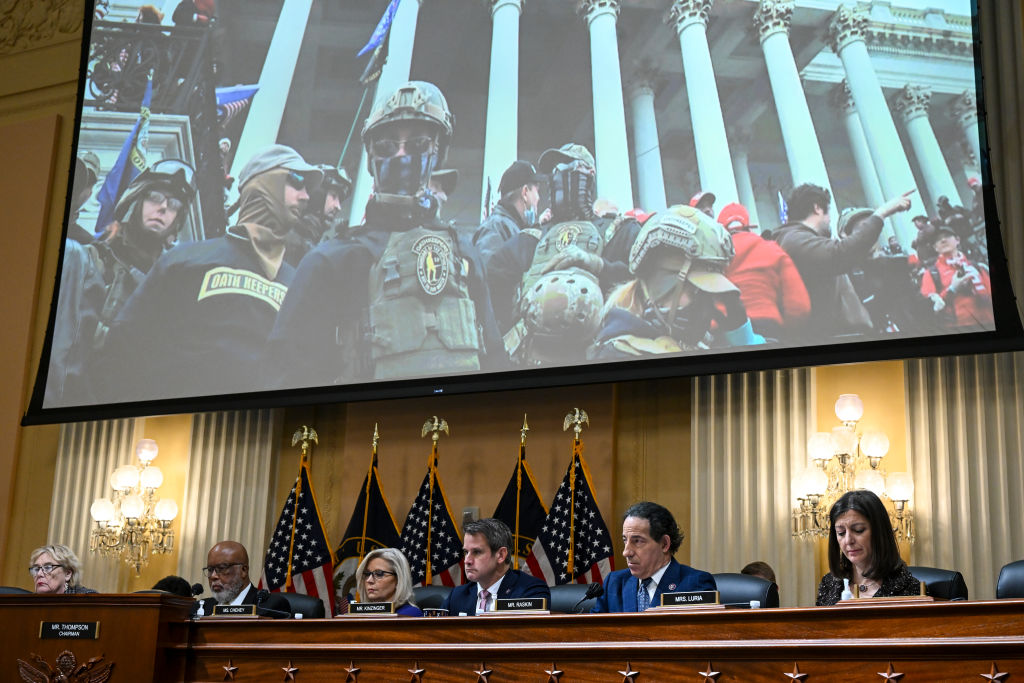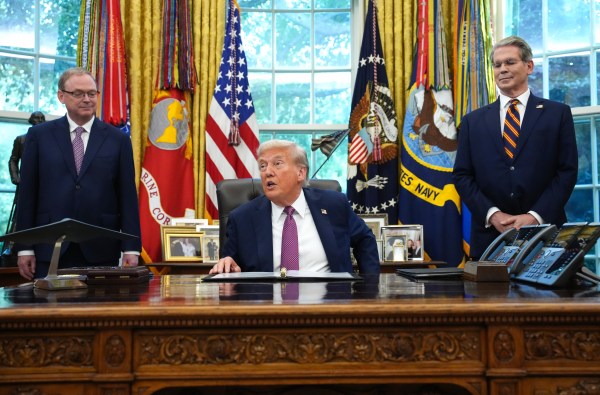Happy Tuesday! You learn something new every day you work in the news business.
Yesterday, for instance, we learned that iguanas have caused at least nine large-scale power outages in Lake Worth Beach, Florida over the past two years. “It’s a nightmare,” a spokesman for the city said.
Quick Hits: Today’s Top Stories
- In addition to releasing the introduction of its final report, the January 6 Select Committee voted Monday in its last public hearing to formally accuse former President Donald Trump of four crimes for his conduct leading up to and on January 6, 2021: obstruction of an official proceeding, conspiracy to defraud the United States, conspiracy to make a false statement, and incitement of an insurrection. The criminal referrals are unlikely to carry much weight with the Justice Department, but federal prosecutors will likely be interested in the thousands of pages of records and interview transcripts the committee has collected in recent months—and is set to release later this week. The committee also voted to refer four Republican lawmakers—including House Minority Leader Kevin McCarthy—to the House Ethics Committee for defying subpoenas, but the move is unlikely to result in any fines or discipline.
- Senate Majority Leader Chuck Schumer said Monday that congressional leaders will include an Electoral Count Act overhaul in the omnibus funding bill Congress plans to pass this week. The changes—targeted at preventing a repeat of the January 6, 2021 Capitol attack—would require 20 percent of members of both the House and Senate to object to a state’s electors to force a vote, and clarify that the vice president has a purely ministerial role in certifying presidential election results.
- Chief Justice John Roberts on Monday temporarily stayed a lower court’s ruling that would’ve required the Biden administration to end Title 42—a pandemic-era policy allowing border officials to quickly expel migrants—by Wednesday. A coalition of 19 Republican-led states asked the Supreme Court to stop the policy’s wind-down, and Roberts’ procedural stay provides time for the Court to decide whether to take on the case.
- European Union energy ministers on Monday agreed on a natural gas price cap that will take effect February 15 and block sales at prices more than about $37 dollars per megawatt hour above a global liquefied natural gas (LNG) price reference. The measure will be triggered if particular gas futures on the Dutch Title Transfer facility—the EU’s benchmark exchange—exceed $191 per megawatt hour for more than three work days in a row and the $37 above LNG prices threshold for the same period. The futures have been trading from about $100 to $160 since October after spiking to a record of about $370 in August when Russia throttled down its gas sales to Europe.
- Federal Judge Roger Benitez blocked a California law allowing private citizens to sue manufacturers of illegal guns, likely setting up a Supreme Court challenge that could have implications for the Texas abortion law California’s gun legislation is modeled after. Gov. Gavin Newsom welcomed the ruling, arguing it demonstrates Texas’ law is also unconstitutional.
- The Federal Trade Commission announced Monday it had reached a $520 million settlement with Epic Games—the maker of Fortnite—in response to allegations the company collected data on children under the age of 13 without their parents’ consent and tricked users into making unwanted purchases. Epic did not admit to any wrongdoing, but said it accepted the agreement because it wants to “be at the forefront of consumer protection and provide the best experience for our players.”
- Sam Bankman-Fried, the disgraced former CEO of the FTX cryptocurrency exchange, agreed on Monday to be extradited to the United States, where he has been indicted on eight counts of fraud, money laundering, and campaign finance violations. Bankman-Fried was arrested in the Bahamas—where FTX was headquartered—last week, and had been in a legal fight over his possible extradition in recent days.
- The Vatican dismissed prominent pro-life activist Frank Pavone from the clerical state, citing his alleged “blasphemous communications on social media” and “persistent disobedience of the lawful instructions of his diocesan bishop.” Pavone—ordained a priest in 1988 and leader of Priests for Life—had written numerous social media posts in recent years calling the results of the 2020 election into question, labeling Biden supporters “goddamn losers” and “God hating,” and urging his audience to vote Republican. Sources close to the case told The Pillar, a Catholic news organization, Pavone’s laicization had more to do with his “persistent disobedience” to his bishop than his public statements.
- Pope Francis told a Spanish outlet over the weekend that, nearly a decade ago, he signed a resignation letter and gave it to then-Cardinal Secretary of State Tarcisio Bertone “in case of impediment due to medical reasons.” Francis turned 86 on Saturday and has used a wheelchair since May, but has kept a busy schedule and plans to travel to Africa next month.
The beginning of the end for the January 6th Select Committee

The House select committee investigating the January 6, 2021 attack on the U.S. Capitol used its final hearing Monday to accuse former President Donald Trump of breaking at least four federal criminal laws in his attempt to subvert the 2020 presidential election. “Every president in our history has defended this orderly transfer of authority—except one,” said Rep. Liz Cheney, the committee’s vice chair. “January 6, 2021 was the first time an American president refused his constitutional duty to transfer power peacefully to the next.”
All nine members of the committee participated in the hearing Monday, detailing the multi-part plan by Trump and his allies to overturn the results of the 2020 presidential election. In addition to issuing criminal referrals, they reviewed evidence from past public hearings, revealed new pieces of information, referred four congressmen to the House Ethics Committee for refusing to comply with subpoenas, and formally adopted the committee’s final report.
The committee released only an executive summary of the report on Monday, but Rep. Bennie Thompson, the committee’s chairman, said in his opening statement that he expects the final product to be made public “later this week” after it is filed with the Clerk of the House. “These transcripts and documents will allow the American people to see for themselves the body of evidence we’ve gathered and continue to explore the information that has led us to our conclusions.”
Among the most important of those conclusions: Trump had been told repeatedly—by his own top advisers, campaign staff, White House lawyers, and even a Cabinet secretary—that the election was not stolen. The former president knew better than anyone that the claims on which he built his attempt to remain in office—and the claims that led directly to the violence at the Capitol on January 6th—were simply not true.
The 154-page executive summary includes details from the testimony of key committee witnesses, including Cassidy Hutchinson, then a top aide to White House chief of staff Mark Meadows, and Pat Cippilone, who served as White House counsel at the time, as well as other senior Trump campaign and White House officials. And while the referrals from the committee carry no legal weight, the mountain of primary source evidence unearthed in its lengthy investigation provides the Department of Justice and others looking into potential lawbreaking with eyewitness accounts and firsthand recollections.
During the committee’s final public hearing, members walked through some of the executive summary’s key findings. And one lawmaker, Rep. Zoe Lofgren, expressed concerns about witness tampering that went beyond the report.
“One lawyer told a witness the witness could, in certain circumstances, tell the committee that she didn’t recall facts when she actually did recall them,” Lofgren said. “That lawyer also did not disclose who was paying for the lawyer’s representation, despite questions from the client seeking that information.” Lofgren further claimed a witness was offered potentially lucrative employment by Trump-adjacent entities.
“The witness believed this was an effort to affect her testimony and we are concerned that these efforts may have been a strategy to prevent the committee from finding the truth,” Lofgren said.
Rep. Adam Schiff’s comments focused on efforts to coerce states into changing the election outcome, including Rudy Giuliani’s pressure on Arizona House speaker Rusty Bowers to embrace voter fraud allegations without evidence and Trump’s request that Georgia Secretary of State Brad Raffensperger “find 11,780 votes.” According to the executive summary, the Republican National Committee was also involved in a scheme to drum up fake electors to send to Congress.
“President Trump personally conducted a teleconference with Eastman and Republican National Committee Chair Ronna McDaniel ‘a few days before December 14’ and solicited the RNC’s assistance with the scheme,” the summary reads. “McDaniel agreed to provide that assistance.”
According to the committee, that meeting may have violated federal law. One of the criminal referrals argues that the submission of fake slates of electors to Congress and the National Archives by Trump associates constituted an illegal criminal conspiracy in violation of section 1001 of title 18 of the U.S. Code, which, in Rep. Jamie Raskin’s summation, “makes it unlawful to knowingly and willfully make materially false statements to the federal government.”
“We believe that this evidence we set forth in our report is more than sufficient for a criminal referral of former President Donald J. Trump and others in connection with this offense,” Raskin said.
Rep. Adam Kinzinger, one of the committee’s two Republicans, noted that “Donald Trump sought to corrupt the U.S. Department of Justice by attempting to enlist Department officials to make purposely false statements and thereby aid his effort to overturn the Presidential election,” according to the executive summary.
“After that effort failed, Donald Trump offered the position of Acting Attorney General to Jeff Clark knowing that Clark intended to disseminate false information aimed at overturning the election.”
The first referral, for obstruction of an official proceeding (title 18 section 512(c)), named Trump, top outside Trump lawyer John Eastman of the Claremont Institute, and “certain other Trump associates,” including lawyer Kenneth Chesebro.
The second, for conspiracy to defraud the United States (title 18 section 371), named Trump, Eastman, and Clark—although the summary also notes that the conspiracy “appears to have also included other individuals such as Chesebro, Rudolph Giuliani, and Mark Meadows,” but that the committee “does not attempt to determine all of the participants of the conspiracy, many of whom refused to answer this Committee’s questions.”
The third referral, for conspiracy to make a false statement under section 1001, named Trump, Eastman, and Chesebro. The fourth—for inciting, assisting, or aiding and comforting an insurrection under title 18, section 2383—named Trump alone.
The summary also included information not covered in the committee’s meeting, including recent testimony from White House Deputy Chief of Staff Tony Ornato (whose claim to not remember whether he told Meadows and Trump about the potential violence the committee found “difficult to believe”) and a finding about a lack of “sufficient assets” by the Capitol Police before the attack.
While the committee’s fact-finding mission is winding to a close, Cheney said in her opening statement that its work is “only the initial step in addressing President Trump’s effort to remain in office illegally.”
Reaction to the meeting and report among other Republicans was mixed.
Trump claimed on Truth Social that “what doesn’t kill me makes me stronger.”
Pence said that Trump’s “actions and words on January 6 were reckless. But I don’t know that it’s criminal to take bad advice from lawyers.”
Senate Minority Leader Mitch McConnell once again adopted a Voldemort-style approach to the former president, but was nonetheless blunt in his assignment of the blame: “The entire nation knows who is responsible for that day. Beyond that, I don’t have any immediate observations.”
Worth Your Time
- Five Wall Street Journal reporters worked on this deep dive into the turmoil at Disney that led to ex-CEO Bob Iger’s return to the company, and it’s chock-full of new details and interesting nuggets. “Mr. Iger, 71 years old, felt slighted that Mr. Chapek didn’t lean on him for advice,” Joe Flint, Robbie Whelan, Erich Schwartzel, Emily Glazer, and Jessica Toonkel write. “He told confidants that Mr. Chapek, 63, was doing a terrible job and that he was incompetent. As Mr. Chapek struggled to find his footing, Mr. Iger hovered in the wings. In a podcast interview, he said the Disney character he would most like to be was Thor, the Norse god who is coaxed out of retirement to help the superheroes conquer the villain Thanos in ‘Avengers: Endgame.’ At the end of 2021, Mr. Iger finally departed Disney after postponing his retirement four times over the years. His return began with a phone call 11 months later, on Nov. 16. Ms. McCarthy, the Disney CFO, was fed up with Mr. Chapek’s performance and leadership, and she turned to the one person she believed could dislodge him. She and Mr. Iger had worked together for more than 15 years and had stayed in touch, including meeting for lunch last summer at the annual gathering of media executives in Sun Valley, Idaho. Ms. McCarthy called to ask Mr. Iger if he would consider returning. He said he would. Two days later, Board Chair Susan Arnold offered him the job, knowing he would likely accept.”
- In a piece for National Review, frequent Remnant guest David Bahnsen pushes back on arguments made by First Things editor Rusty Reno against free markets and in favor of using political power to ensure virtue. “The cabal of new-right market skeptics are stuck with the age-old problem identified by the Founders, and yes, by 20th-century giants such as Friedman and Hayek: We have no option to be ruled by angels,” Bahnsen writes. “The doctrine of the Fall does not merely inform our understanding of the original sin plaguing individuals and families, but also and especially the state itself. That an individual left unchecked and free of moral enlightenment may suffer in weak discipline and low taste is both true and tragic. But that a civil magistrate granted the power Reno envisions for it represents a more potent and damaging fruit of original sin is, indeed, the testimony of history. On this point there can be no refutation. I prefer that the low-brow permeation of social-media obsession die a holy death, yet inviting the ghosts of 20th-century past to regulate consumer preferences strikes me as a ghastly trade-off.”
Presented Without Comment
Also Presented Without Comment
Toeing the Company Line
- It’s Tuesday, which means Dispatch Live (🔒) returns tonight at 8 p.m. ET/5 p.m. PT! In the last episode of 2022, David, Kevin, and other writers will take a look back at the wild year that was: the highlights, the lowlights, the weirdest headlines, and more. As always, there will be plenty of time for viewer questions.
- On today’s episode of Advisory Opinions, David and Sarah dive into the latest Twitter Files revelations, considering whether they point to legitimate First Amendment concerns. Plus: A conversation about the first Supreme Court case involving transgender athletes, and a resolution to the grammatical debate that’s broken out in the comments section.
- In an edition of Wanderland (🔒) that’s part TV review, part cultural critique, Kevin notes Netflix’s new series has transformed Wednesday Addams from sadistic to social justice oriented. “We cannot endure the moral discomfort imposed on us by stories in which the protagonists—even Hannibal Lecter and Wednesday Addams—are not entirely on the side of the angels,” he writes. “In a similar way, the insistent hysterical conformism of campus life that has spilled over into corporate life and entertainment is, I think, moral insecurity masquerading as moral certitude.”
- The latest edition of Boiling Frogs (🔒) preemptively tap dances on Kevin McCarthy’s political grave and wonders if there’s anything Democrats could do to make his quest for the speakership even more treacherous. “Having traded every last bit of his dignity for the speakership, he still might not land the job,” Nick writes. That’s the latest humiliation. Are you enjoying it? I sure am.”
- On the site today, Andrew digs into Floria Gov. Ron DeSantis’ recent vaccine-skepticism and its political repercussions for the possible 2024 presidential contender.
Let Us Know
What are the long-term effects of the work of the January 6th Committee? Does the fact that the committee was heavily Democratic matters in assessing its effectiveness?






Please note that we at The Dispatch hold ourselves, our work, and our commenters to a higher standard than other places on the internet. We welcome comments that foster genuine debate or discussion—including comments critical of us or our work—but responses that include ad hominem attacks on fellow Dispatch members or are intended to stoke fear and anger may be moderated.
With your membership, you only have the ability to comment on The Morning Dispatch articles. Consider upgrading to join the conversation everywhere.